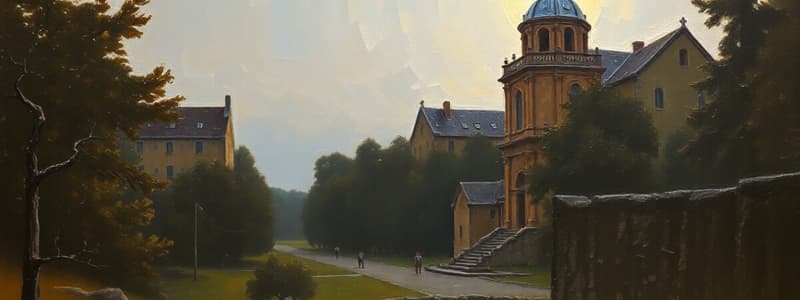Podcast
Questions and Answers
What is history?
What is history?
A chronological record of significant events affecting a nation or institution, often including an explanation of their causes.
Why do we study history?
Why do we study history?
To avoid repeating the mistakes of the past.
What are primary sources?
What are primary sources?
- Documents written after an event
- Interpretations of past events
- Documents created during the time under study (correct)
- Textbooks and encyclopedias
What defines a secondary source?
What defines a secondary source?
Which of the following is an example of a primary source?
Which of the following is an example of a primary source?
Which of the following is a type of secondary source?
Which of the following is a type of secondary source?
Oral histories are generally considered unreliable.
Oral histories are generally considered unreliable.
What are visual sources?
What are visual sources?
What is an artifact?
What is an artifact?
What types of primary sources can we use?
What types of primary sources can we use?
Those who are ignorant of the mistakes of the past are doomed to __________ them.
Those who are ignorant of the mistakes of the past are doomed to __________ them.
Flashcards are hidden until you start studying
Study Notes
What is History?
- A chronological record of significant events that affect a nation or institution.
- Includes an explanation of the causes of events.
- A study of past events, examining how and why they happened.
- A study of the consequences of past events.
- A branch of knowledge that records and explains past events.
Why Study History?
- History helps us understand the present and future by learning from the past.
- People who are ignorant of past mistakes are more likely to repeat them.
How Do We Understand History?
- Historians use a scientific process to study history.
- This process involves asking questions, conducting research, forming hypotheses, testing those hypotheses with intensive research, and drawing conclusions.
Types of Historical Evidence
- Historians rely on different types of evidence to reconstruct the past:
- Written records: Letters, diaries, newspapers, books.
- Oral records: Stories, music, speeches.
- Visual records: Photographs, artwork, film footage.
- Artifacts: Physical objects left behind, such as buildings, clothing, pottery.
Primary Sources
- A primary source is a document or artifact created during the time period being studied.
- Primary sources provide a firsthand perspective on events.
- Examples of primary sources include original documents (letters, diaries, speeches, etc.), creative works (poetry, music, art), and relics or artifacts.
Secondary Sources
- A secondary source analyzes and interprets primary sources.
- Secondary sources are created after the event and offer an outside perspective.
- Examples of secondary sources include textbooks, magazine articles, biographies, and histories.
Evaluating Sources
- When evaluating a source, consider:
- What is the source?
- When and where was it created?
- Who created it?
- For whom was it created?
- What was the creator's intent?
The Oral Record
- Oral history plays a vital role in cultures without a written tradition.
- Oral history is often passed down through generations, preserving knowledge, stories, and traditions.
The Visual Record
- Visual sources provide valuable insights into past societies and events:
- Photographs: Capture moments in time, showing what people looked like, how they dressed, and what their surroundings were like.
- Artwork: Reflects cultural values, beliefs, and experiences.
- Video: Provides recordings of events.
The Artifact Record
- An artifact is a physical object left behind by a past civilization.
- Artifacts can provide clues about everyday life, technology, and social structure.
- Examples of artifacts include tools, pottery, weapons, and buildings.
Studying That Suits You
Use AI to generate personalized quizzes and flashcards to suit your learning preferences.




